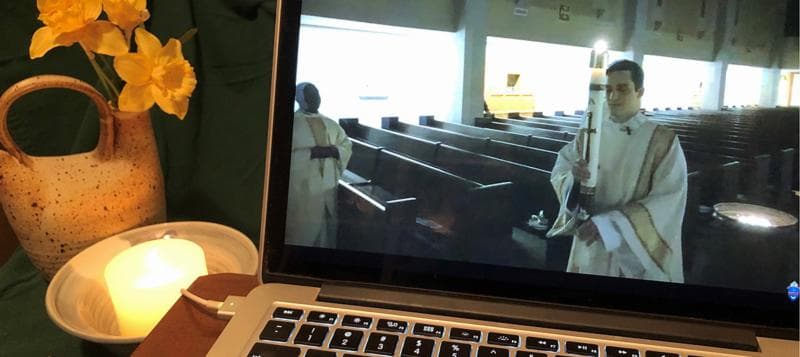BURLINGTON, Vermont — As COVID-19 forced churches across the world to suspend public worship, Catholic parishes faced a sort of identity crisis. Separated from the Eucharist, their place of gathering, and each other, many wondered how to sustain a community when even the act of leaving one’s home posed danger.
The challenge mobilized parishes to respond creatively. Priests livestreamed Mass in front of empty pews, prayer groups convened over videoconferencing platforms, and volunteers dialed up other parishioners to see how they were doing.
While most of those responses were swift reactions to partially regain the features of a Catholic community, a virtual seminar hosted Wednesday by the McGrath Institute for Church Life at the University of Notre Dame sought to examine the deeper, theological implications of remote parish life.
The seminar — titled “Taking Responsibility for Parish Life” — kicked off a series of online events in lieu of McGrath’s annual Summer Institute. Each event will discuss how laity and clergy are “co-responsible” for stewarding an aspect of Church life, building off the Institute’s “Called and Co-Responsible” conference in March.
RELATED: Clergy and laity share ‘co-responsibility’ in Church, bishop says
Leonard DeLorenzo, director of undergraduate studies at the McGrath Institute, led the seminar with a reflection on what constitutes a parish, and who is responsible for fostering it. DeLorenzo pointed to the Eucharist as the cornerstone and purpose of the parish.
“The Eucharist is the basis of the stability of the parish, because Christ dwells with and abides with this people; right here, in their midst” he said. “The parish community is formed around that sacrifice of abiding with us.”
This idea comes directly from the Catechism of the Catholic Church, which defines a parish as “the place where all the faithful can be gathered together for the Sunday celebration of the Eucharist.”
Given the vitality of the Eucharist to parish life, DeLorenzo turned to the issue currently faced by the Church: What does a parish become when it is unsafe to gather and celebrate the Eucharist?
“Did that mean that parish life was suspended? As if we’ve taken a break from parish life?” DeLorenzo asked the seminar’s over 200 participants. “Or, conversely, might it be in times such as these that parish life is most critical? Is this when we most need the stability of a Eucharistic community?”
While DeLorenzo phrased his reflection as a query, he also provided an answer through taking action in his own parish. Shortly after his home state of Indiana suspended public Masses, DeLorenzo and a group of lay people began a ministry they called “Parish Life Outreach.”
At its core, the project is simply reaching out to parishioners via telephone in an effort to maintain parish life. After divvying up the parish registry, DeLorenzo and his team contacted parishioners with three objectives:
— Check in to see how the parishioners are doing
— Offer to help the parishioners with any needs they have
— Extend further support to anyone the parishioners know who needs help
“In other words, we wanted to really say that our parish community is here to serve,” DeLorenzo said.
To spread the Parish Life Outreach model, DeLorenzo published the idea in a piece for Our Sunday Visitor. Sue Bismack, a member of the pastoral council at St. John Vianney Parish in Saginaw, Michigan, read DeLorenzo’s article and jumped at the opportunity to help connect her parish.
Bismack told seminar participants how she organized her own outreach team and started calling parishioners, including some she had never met before.
“In the beginning we had a few who, as we called, were skeptical,” she said. “They put on that voice, you know, ‘is this a telemarketer?’ because they didn’t recognize the phone number.”
The callers gained trust, though, when they offered to pray for the parishioner.
“We found that the offer of prayer opened a lot of hearts,” Bismack said, “especially with our younger demographic.”
In Wisconsin, Amy Albers undertook a similar initiative to call people. The director of faith formation for St. John the Baptist Parish in Plymouth told participants she called all the families registered in the parish’s religious education program to see how they were coping with the lockdown.
“I think some of them just needed to talk to somebody different, somebody that’s not school-based,” she said. “It was an opportunity to find out really what they need.”















